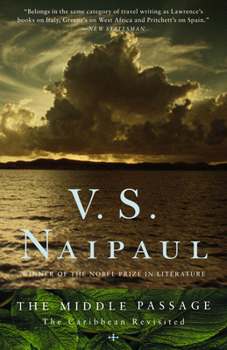The Middle Passage: The Caribbean Revisited
Select Format
Select Condition 
Book Overview
From the Nobel Prize-winning author comes a classic of modern travel writing--a deft portrait of Trinidad and the four adjacent Caribbean societies still haunted by the legacies of slavery and colonialism. "Belongs in the same category of travel writing as Lawrence's books on Italy, Greene's on West Africa and Pritchett's on Spain." --New Statesman In 1960 the government of Trinidad invited V. S. Naipaul to revisit his...
Format:Paperback
Language:English
ISBN:0375708340
ISBN13:9780375708343
Release Date:January 2002
Publisher:Knopf Publishing Group
Length:256 Pages
Weight:0.45 lbs.
Dimensions:0.7" x 5.2" x 8.0"
Customer Reviews
4 ratings
Middle Passage
Published by Thriftbooks.com User , 14 years ago
Anything by VSN has been a pleasure to read. First ever book I read of his was in 1968 An Area of Darkness. And since then I have read his all books. His Autobiography by Patrick French is worth reading. Dr PSNagi
Masterful writing
Published by Thriftbooks.com User , 17 years ago
No writer writes with more pointed anger than the young Naipaul, and this book, along with An Area of Darkness, strikes the most strident note of rage. This is not surprising. The young Naipaul reserved his rage for the places, people and things which struck closest to his roots: for An Area of Darkness, India, and for the Middle Passage, even closer, the Caribbean. Although most of the places he writes of in this book have been radically transformed in the forty years since this was written, The Middle Passage is still worth reading. The writing, even when it levels off into casual meanness, is superb. This book amply illustrates Naipaul's complete mastery as a travel writer. Few writers get to the heart of place, its dark muddled center, than Naipaul, and he lays it out clear, crisp, and pointedly, and then moves on.
wonderful but dated
Published by Thriftbooks.com User , 19 years ago
This wonderful quick read is V.S Naipaul's travels from Trinidad, to British Guinea through Suriname and then on to Martinique and Jamaica in the early 1960s. The dated feature makes the read fascinating. Here we see how racial issues have surfaced in Trinidad, where the Urban black population is at variance with the rural indian one. We see this through the eyes of an English educated Indian returning home to a nation he both loves and hates. He remarks att he outfite, the attire and aspirations of the people. In Guinea he meets Mr. Jagan, the Indian Communist leader who Naipaul will return to in his book "The Writer and his World". In Suriname we learn about a dutch colony where race has not been the deciding factor. Fascinating and poetic this story is a tour of the culture of the caribean. Of transplanted Africans and Indians living on islands and places once inhabited by natives, of the stirrings of colonial peoples and independence. A must read. Full of color, history, insights and amazing characters. Seth J. Frantzman
A book to read and reread
Published by Thriftbooks.com User , 22 years ago
'The Middle Passage' is the account of a sunny journey across the Caribbean in 1960-61. During his travelling, Naipaul enjoys the calypso in Trinidad, takes a memorable hiking trip to the Nutchi falls in British Guyana, travels around the picturesque roads of Martinique, enjoys a cool beer in Brazil, and goes to the beaches of Jamaica and Surinam. However, Naipaul is not primarily interested in the joys which an average tourist might take from such a dreamt-of holiday. `The Middle Passage' is a book with a purpose: it seeks to dissect the ways in which different Caribbean territories deal with the legacy of more than 400 years of European domination. There is very much Naipaul doesn't like about the people living in these (post-)colonial societies. But his sharp eye and elegant prose lead to a cascade of eye-opening, stunning and often merciless observations which makes this book still mandatory reading today.On the multi-layered social structure of Trinidadian society, Naipaul says: "[The Trinidadian] is adaptable; he is cynical; having no rigid social conventions of his own, he is amused by the conventions of others. [..] If the Trinidadian has no standards of morality he is without the greater corruption of sanctimoniousness."On the Indians of British Guyana: "Among more complex peoples there are certain individuals who have the power to transmit to you their sense of defeat and purposelessness: emotional parasites who flourish by draining you of the vitality you preserve with difficulty. The Amerindians had this effect on me."On Martinique: "Martinique in the interior is prettily feudal, with a white or coloured gentry and a respectful mass of straw-hatted black people who can only be described as `peasants', the twentieth-century literary discovery, whose soft manners, acquiescence in their status and general lack of ambition or spirit can be interpreted a `dignity'."Finally, on `poor whites': "[H]ere and there in the West Indies are little groups of `poor whites', whose poverty is their least sad attribute. [A]merindians `sickened and died'; these Europeans [..] only sickened, and are like people still stunned by their transportation to the islands of this satanic sea."




